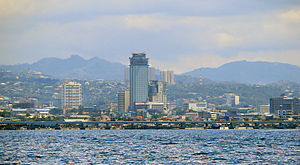| Del Monte Fresh Produce Pineapple (Photo credit: Del Monte Fresh Produce) |
Del Monte Pacific Ltd., controlled by condiments king Joselito D. Campos Jr., is planning a dual listing in the Singapore and Philippine stock markets.
This will make Del Monte the first local firm to be listed in both the Singapore Stock Exchange (SGX-ST) and Philippine Stock Exchange (PSE).
In a disclosure to SGX-ST, Del Monte said it submitted to the PSE and Securities and Exchange Commission an application for a listing by way of introduction.
“The proposed dual listing will provide the company with a platform to widen its investor base,” Del Monte said.
“In particular, it will enhance the company’s attractiveness to investors in the Philippines and to foreign investors interested in the Philippine stock market,” it added.
Listing by introduction allows a firm to join the PSE without having to sell shares to the public immediately.
Del Monte said being listed on both the SGX-ST and PSE will “enhance the profile and market visibility” that will result in greater liquidity.
Being a public company attracts coverage from brokerage firms, which provide valuations and recommendations to the investing public.
“The proposed dual listing will also allow the company to establish financing platforms in two different equity markets simultaneously,” Del Monte said, adding that extra channels and ready access to a wide pool of capital will fund future business growth.
Given its plan to list by way of introduction, Del Monte said it will not immediately issue new shares but there might be an offer of vendor shares depending on the market’s condition.
Vendor shares are stocks issued by a company in payment or in part payment for assets acquired from the vendor.
Aside from Del Monte, PSE-listed tuna and salmon processor Alliance Select Foods International Inc. is planning to conduct a dual listing in the Singapore and Philippine bourses.
Del Monte produces, markets and distributes food, beverages, and related products in the Asia-Pacific region and the Indian subcontinent, and has supply deals with Del Monte trademark owners and licensees around the world.
The NutriAsia Group of Campos owns a majority stake in Del Monte. NutriAsia leads the Philippine market for condiments, specialty sauces and cooking oil.
In 2012, sales of Del Monte climbed eight percent to a record $459.7 million while net profit jumped to $32.1 million.
















